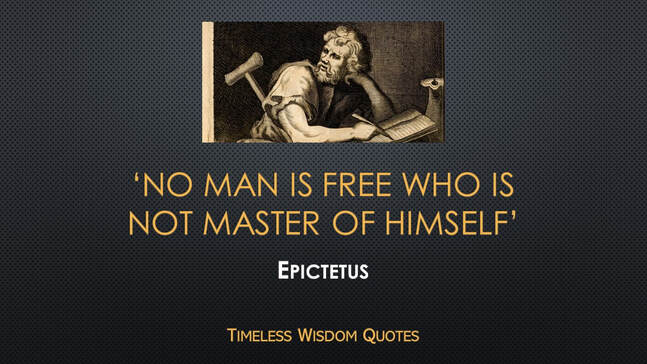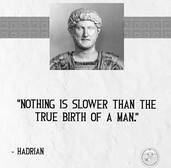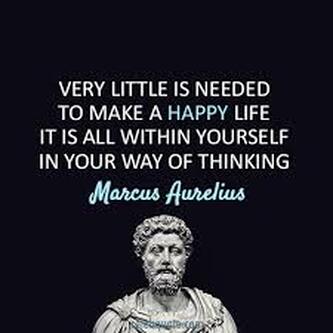|
This month's guest post is brought to you courtesy of The Stoic Gym. One of the very best sites in the world for all things stoic. Enjoy:)
By Dr. Chuck Chakrapani
Mindfulness is not a standard Stoic term, but the concept plays an important role in Stoic thinking. For our purposes, if we define mindfulness as the art of paying deliberate attention, then we will see its critical role in moving us towards Stoic virtues and towards the good life.
Mindfulness And Wisdom According to Stoicism, we are constantly presented with what are known as ‘impressions’. Impressions are stimuli as they appear to us. Someone tells you that you are hard to understand. You may think that:
All of the above are ‘impressions’. Any of them may be correct or incorrect. Impressions often involve judgment. In the above example, let’s say your initial judgment is that the other person is not paying attention. If you accept this judgment, then your subsequent behaviour towards the other person will be coloured by this judgment. If you reject this judgment and instead think that perhaps you were talking too fast, then what you do next will be decided by this judgment.
Most of us are too quick to act on our initial impressions. In Stoic practice, this is not a good idea. We need to tell the impression:
''Hey impression, wait for me a while. Let me see what you are and what you represent. Let me test you before accepting you.'' Epictetus, Discourses 2.18.24 (Chuck Chakrapani, Stoic Choices, Ch. 18) This is the art of choosing our response before responding. The art of examining the impression and deciding whether to assent to it or not is Stoic mindfulness. We should not mindlessly assent to the first impression that comes to us but mindfully examine it to decide whether to assent to it or not because, as Viktor Frankl points out, “in our response lies our growth and our freedom.” The first virtue in Stoicism is wisdom. Wisdom is the art of choosing to act or not to act in a particular way. It is the art of right assent. It is the result of paying attention to impressions and examining them in a mindful way. Mindfulness And Justice Mindfulness is also related to the second virtue of Stoicism, justice. Justice refers to two things in Stoicism. One, to know what belongs to you and what does not belong to you so you can give everyone their due. The second is to understand that we are not isolated beings. We are a part of a family, a society, a country, and the world. Our good is related to what is good for things we are related to. What is not good for the world we live in is not good for us. "What is not good for the beehive is not good for the bee." Marcus Aurelius, Meditations, 6.54 (Chuck Chakrapani, Stoic Meditations, Bk 6.54) Whenever we are carried away by greed and try to grab what is not ours and whenever we mindlessly damage our relationships with our family, friends, society, or the world, we can pull back and mindfully examine our impulses. We may find that: "i. This thought is unnecessary. ii. This thought is destructive to our fellowship. iii. This is not our true thought (it is out of place because it does not come from our heart.) iv. When we are tempted to blame our self, our divine part is beaten by our body, the inferior and perishable part." Marcus Aurelius, Meditations. Ch. 11.9 (Chuck Chakrapani, Stoic Meditations, Book 11.9
Mindfulness And Moderation
We are carried away by our desires. Some of us eat or drink mindlessly. Addictions to food, alcohol, and drugs can be the result of our not being mindful of our actions. When we are mindful, we deliberately look at our desires. Do we really want to have another drink or are we having one out of habit? Are we just eating for the sake of eating? When we question ourselves mindfully, we may moderate our desires. A mindful look at our unexamined desire may strengthen our self-control or moderation, a cardinal Stoic virtue. Mindfulness And Courage We have many aversions or fears such as fear of poverty, fear of illness, fear of old age, and fear of death. Such fears are groundless for two reasons. First, they are not under our control and it does not help to be afraid of what is not under our control. Second, we will have same resource we use now to cope with them when we come to them. "You will meet it — if you have to — with reason, the same resource you use now to deal with life." Marcus Aurelius, Meditations. Ch. 7.8 (Chuck Chakrapani, Stoic Meditations, Book 7.8) When we examine our fears, we will see that we have several resources. 'Remember that, for every challenge you face, you have the resources within you to cope with that challenge … When you have pain, you have the resource of endurance. When you are insulted, you have the resource of patience. If you start thinking along these lines, soon you will find that you don’t have a single challenge for which you don’t have the resource to cope.' — Epictetus Enchiridion 10 Because we often panic when we face our aversions, we become fearful. But when we mindfully examine our fears and understand that we have nothing to fear, we develop the fourth Stoic virtue, courage. Stoicism teaches us to deliberately examine the validity of our impressions and not accept hasty judgments but, rather, move towards Stoic virtues. This ‘pause-and-examine’ approach to a life of virtue is Stoic mindfulness.
Books by Dr. Chuck Chakrapani
We are always on the lookout for great content, if you're a writer or wish to recommend a post contact [email protected]
|
Archives
March 2021
Categories |
The Conquerors Pledge
Strive for excellence, control your desires, discipline your mind, speak the truth and exceed yourself.
Respect your mother & father. Respect yourself.
These principles will help you to conquer yourself, make you stronger, give you hope and create momentum for personal greatness.
Proudly Powered by Azuni World 'Where passion meets knowledge'
Copyright © 2015-2024 All Rights Reserved
Copyright © 2015-2024 All Rights Reserved




 RSS Feed
RSS Feed

